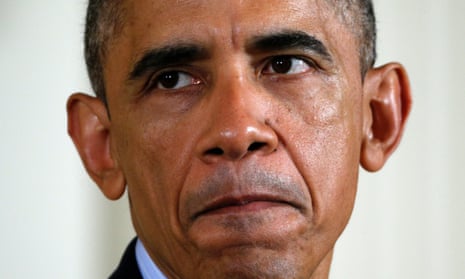Here’s a brief history of immigration reform during the candidacy and presidency of Barack Obama:
2008
- The presidential run: In a May appearance in Denver, Colorado, which has an electorally significant Latino population, candidate Barack Obama tells Univision host Jorge Ramos, “I can guarantee that we will have, in the first year, an immigration bill that I strongly support.”
- November: Obama is elected president with 67% of the Hispanic vote and 62% of the Asian vote, according to exit polls.
2009
- June: After a half year of work on an economic stimulus plan, unemployment insurance, an auto bailout and more, the Obama administration lumbers to life on immigration. “His position is very clear: he thinks we need comprehensive immigration reform,” David Axelrod, then senior adviser, told the New York Times in an interview. “But that’s not something that’s going to happen simply on his volition.” Congress doesn’t bite.
2010
- January: Obama devotes a couple paragraphs of his state of the union address to immigration reform. “We should continue the work of fixing our broken immigration system – to secure our borders and enforce our laws, and ensure that everyone who plays by the rules can contribute to our economy and enrich our nation,” he says. “In the end, it’s our ideals, our values that built America – values that allowed us to forge a nation made up of immigrants from every corner of the globe; values that drive our citizens still.”
- December: The DREAM Act, which would have extended protection against deportation to children of undocumented immigrants, falls short in the Senate by a vote of 55-41, after having passed the House. A disappointment for activists who had worked for the legislation since 2001, when it was first introduced in the Senate. The bill had been voted down in a previous outing in 2007.
2011
- May: The White House releases a Blueprint for Building a 21st Century Immigration System. “We must finish the work Congress started last year, and pass the DREAM Act,” the document says. “We must respect families following the rules – reuniting them instead of splitting them apart. And, we need to provide farmers a legal way to hire workers and a path for those workers to earn legal status.”
2012
- June: In a major policy intervention, Obama orders immigration enforcement agents to defer action against young people who had arrived to the United States as children. The move, known as deferred action for childhood arrivals, is estimated to affect 580,000 immigrants. It offers a path to work permits. Some reform advocates criticize the move for not doing more to protect families and not protecting more young immigrants.
- November: Obama is reelected president, this time with 71% of the Hispanic vote and 73% of the Asian vote, according to exit polls. Obama demolishes former Massachusetts Governor Mitt Romney among Hispanic and Latino voters by more than 40 points.
- November: House Speaker John Boehner tells ABC News that immigration “ought to be dealt with”. “This issue has been around far too long. While I believe it’s important for us to secure our borders and to enforce our laws, I think a comprehensive approach is long overdue, and I’m confident that the president, myself, others, can find the common ground to take care of this issue once and for all.”
2013
- January: Obama advances new principles for immigration reform in a speech at Del Sol high school in Las Vegas. The principles are in line with a plan being crafted in the Senate by a bipartisan Gang of Eight senators.
- June: The Senate passes the Gang of Eight’s immigration reform bill 68-32. The bill contained a path to citizenship over 13 years for undocumented workers and some $40bn for border security. The House would never vote on it.
- November: A year after he said immigration reform “ought to be dealt with”, House Speaker John Boehner says he will not convene a conference to reconcile potential House legislation with the bill that passed the Senate. Legislative action stalls.
2014
- January: House Republicans come back from a caucus retreat and release immigration “principles”. The principles do not allow for a path to citizenship, as did the Gang of Eight legislation that passed the Senate.
- 4 November: Republicans take the Senate in midterm elections and expand their majority in the House. Incoming Senate majority leader Mitch McConnell warns Obama not to take unilateral action on immigration, saying that would be like “waving a red flag in front of a bull”.
- 19 November: Obama plans a primetime speech to announce major new executive actions on immigration reform.

Comments (…)
Sign in or create your Guardian account to join the discussion